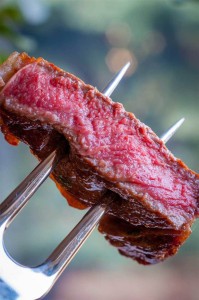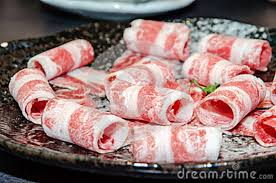With full respect to Kurt Vonnegut, I listen to the ethical pronouncements of the leaders of the church of organic and am able to distill only two firm commandments from them. The first commandment is this: Stop thinking. The second commandment is this: Obey. Only a person who has given up on the power of reason to improve life here on earth, or a soldier in basic training, could accept either commandment gladly.
 Food is 21st century snake oil. In an era of unprecedented affluence, consumers now choose among a cacophony of low‑fat, enhanced‑nutrient staples reflecting a range of political statements and perceived lifestyle preferences, far beyond dolphin‑free tuna.
Food is 21st century snake oil. In an era of unprecedented affluence, consumers now choose among a cacophony of low‑fat, enhanced‑nutrient staples reflecting a range of political statements and perceived lifestyle preferences, far beyond dolphin‑free tuna.
And to go with the Salt Spring Island goat cheese, the all‑organic carrots and the Snapple-laced echinacea is a veritable sideshow of hucksters and buskers, flogging their wares to the highest bidder ‑‑ these things always cost a premium ‑‑ or at least the most fashionable.
In 2001, the U.K. Advertising Standards Authority (ASA) upheld four complaints against claims in a Soil Association leaflet entitled Five Reasons To Eat Organic. The ASA ruled there was no evidence that, contrary to the assertions of the Soil Association, that consumers could taste the difference, that organic was healthy, that it was better for the environment, and that organic meant healthy, happy animals. On one claim, the Soil Association responded that 53% of people buying organic produce did so because they thought it was healthy. The ASA rightly ruled this did not constitute any sort of clinical or scientific evidence.
Alan Levinovitz writes for NPR that from Paleo to vegan to raw, nutrition gurus package their advice as sound, settled science. It doesn’t matter whether meat is blamed for colon cancer or grains are called out as fattening poison — there’s no shortage of citations and technical terms (tertiary amines, gliadin, ketogenesis) to back up the claims.
But as a scholar of religion, it’s become increasingly clear to me that when it comes to fad diets, science is often just a veneer. Peel it away and you find timeless myths and superstitions, used to reinforce narratives of good and evil that give meaning to people’s lives and the illusion of control over their well-being.
Take the grain-free monks of ancient China. (My specialty is classical Chinese thought.) Like all diet gurus, these monks used a time-tested formula. They mocked the culinary culture around them, which depended on the so-called wugu, or “five grains.”
According to the monks’ radical teachings, conventional grain-laden Chinese diets “rotted and befouled” your organs, leading to early disease and death. By avoiding the five grains, you could achieve perfect health, immortality, clear skin, the ability to fly and teleport. Well, not quite. To fully realize the benefits of the monks’ diet, you also had to take proprietary supplements, highly technical alchemical preparations that only a select few knew how to make. All of this may sound eerily familiar: Look no further than modern anti-grain polemics like Dr. David Perlmutter’s Grain Brain — complete with its own recommended supplement regimen.
Despite basic logic and evidence to the contrary, the philosophy of the grain-free monks gained popularity. That’s because then, as now, the appeal of dietary fads had much to do with myths, not facts. Chief among these is the myth of “paradise past,” an appealing fiction about a time when everyone was happy and healthy, until they ate the wrong food and fell from grace.
 The mythic narrative of “unnatural” modernity and a “natural” paradise past is persuasive as ever. Religious figures like Adam and Eve have been replaced by Paleolithic man and our grandparents: “Don’t eat anything your great-grandmother wouldn’t recognize as food,” is journalist Michael Pollan’s oft-quoted line.
The mythic narrative of “unnatural” modernity and a “natural” paradise past is persuasive as ever. Religious figures like Adam and Eve have been replaced by Paleolithic man and our grandparents: “Don’t eat anything your great-grandmother wouldn’t recognize as food,” is journalist Michael Pollan’s oft-quoted line.
The story also has a powerful moral dimension. It’s the Prince of Evil, after all, who tempted Eve. Once secularized, Satan reappears as corporations and scientists who feed us chemical additives, modern grains and GMOs, the “toxic” fruits of sin. (No matter if science doesn’t agree that any of these things are very toxic.)
Paradise past. Good and evil. Benevolent Nature with a capital N. The promise of nutritional salvation. After you’ve constructed a compellingly simple narrative foundation, all you have to do is wrap your chosen diet in scientific rhetoric.
For Chinese monks, that rhetoric involved “five phases theory.” For ancient Greeks and Romans it was “humors” — four fluids thought to be the basis of human health. Now it is peer-reviewed studies. Thankfully for diet gurus, the literature of nutrition science is vague, vast and highly contested — just like religious texts — making it easy to cherry-pick whatever data confirm your biases.
 Bobby Flay writes: Heat your grill to high. Brush the steaks on both sides with oil and season liberally with salt and pepper. Place the steaks on the grill and cook until golden brown and slightly charred, 4 to 5 minutes. Turn the steaks over and continue to grill 3 to 5 minutes for medium-rare (an internal temperature of 135 degrees F), 5 to 7 minutes for medium (140 degrees F) or 8 to 10 minutes for medium-well (150 degrees F).
Bobby Flay writes: Heat your grill to high. Brush the steaks on both sides with oil and season liberally with salt and pepper. Place the steaks on the grill and cook until golden brown and slightly charred, 4 to 5 minutes. Turn the steaks over and continue to grill 3 to 5 minutes for medium-rare (an internal temperature of 135 degrees F), 5 to 7 minutes for medium (140 degrees F) or 8 to 10 minutes for medium-well (150 degrees F).









